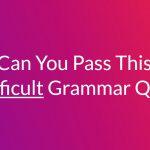Are you truly a grammar hammer?
Quiz: Ace This Tricky Grammar Quiz And Your IQ Is Above 145
Are you a grammar nerd who always corrects other people's mistakes? Or do you struggle with the rules of language and need some practice? Test your grammar skills with our challenging quiz and find out if your IQ is above 145! This quiz includes questions on topics such as punctuation, verb tense, and sentence structure. Don't be fooled by the seemingly easy questions at the beginning - the difficulty level increases as you progress through the quiz. Answering correctly to all the questions will not only make you feel like a grammar genius but also may boost your self-esteem. So, grab a pen and paper, and let's get started!





